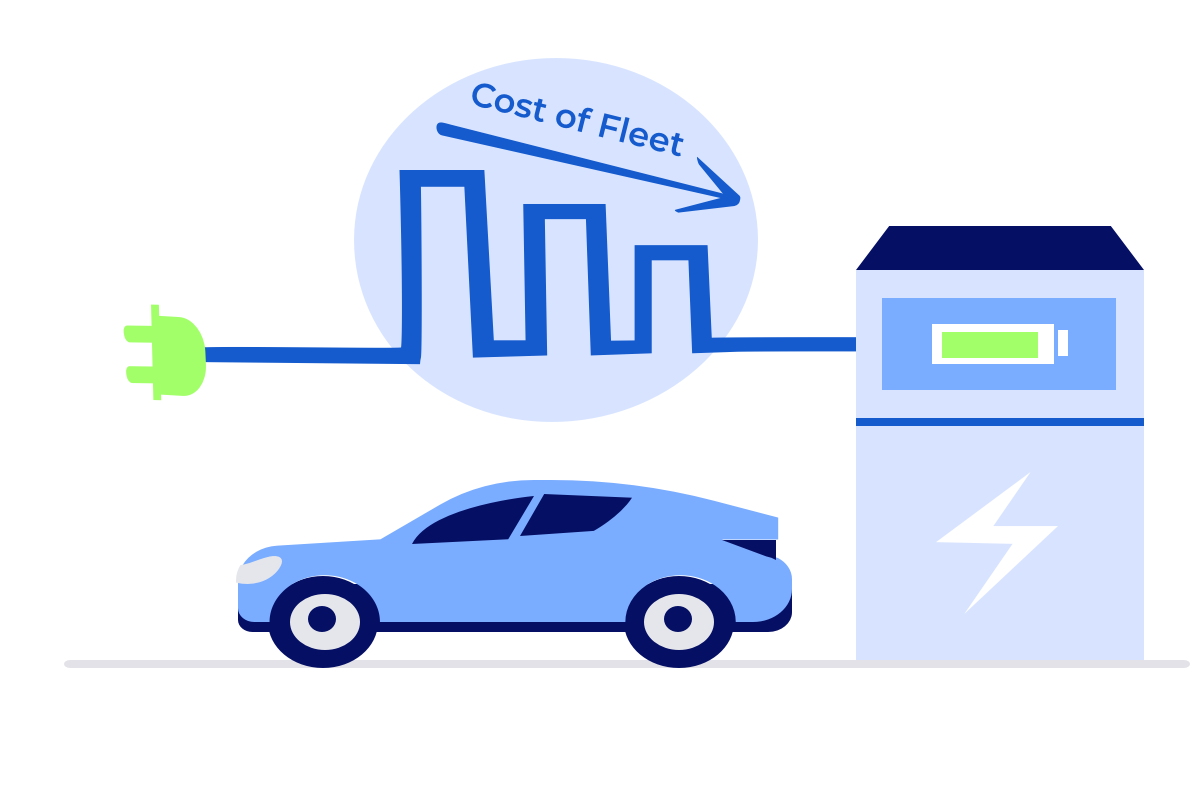
The global EV Truck market is estimated at 1.48 billion dollars at set to reach 15 billion dollars by 2027
EV industry in a nutshell
EV or Electric Vehicles are electric motor-run vehicles that use either rechargeable batteries or hydrogen-powered batteries as compared to the traditional vehicles that use petrol, diesel or gasoline to run their engines. They range from bikes, cars to commercial vehicles like trains, buses, planes, taxis and even industrial vehicles. The market for EVs and EV Fleet Management services is on a rise all across the globe primarily due to their increasing affordability and availability.
How is the EV industry benefiting?

Governments and manufacturers around the world are pushing to accelerate EV adoption for transport and logistics
Governments around the world are pushing for a shift from these traditional vehicles to modern electric vehicles to cut their carbon emissions in the wake of the growing threat of climate change. The push towards EV comes primarily from governments in the form of:
- Capital Investments in increasing and improving infrastructures for EV charging stations.
- Incentives offered to automobile manufactures which include, corporate tax cuts, industrial land for manufacturing, government contracts, direct investment, etc for increasing EV production.
- Regulation and Policies to promote EV by incorporating EVs in public transport vehicles.
- Direct benefits and subsidies to consumers and corporates for purchasing EV vehicles.
- Production commitments from global automakers like Volvo, Tata, Mercedes, Boeing among others.
How is Fleet Management Impacted by the adoption of EV Fleet?

EVs can significantly bring down the cost of operating Fleets
As the demand for commercial EVs grows further and more commercial EVs are being used for business, we hope to see a mix of EV fleets only or a mix of electric and fuel-run fleets.
Only EV fleets have been gaining popularity in the light vehicle segment and taxis around the world with heavy commercial vehicles like trucks, planes and airport taxing vehicles still mostly in the trial phase with few notable exceptions. Following companies have adopted electric-only fleets or mixed fleets.
- BluSmart Mobility:
BluSmart Mobility is an e-taxi startup based out of Gurugram, India which runs a fleet of over 300 EV taxis in Delhi-NCR region. Instead of being a taxi-aggregator, it leases and operates EVs from top automakers like Mahindra & Tata Motors using smart Fleet Management Software solutions optimized for EV vehicles. - Uber Green:
Uber Green is the EV Taxi fleet operating in countries like the US & UK offering subsidies to drivers to upgrade to an electric vehicle. Uber Green is integrated with Uber’s fleet management system managing both fuel-based and EV taxis. It's also offering subsidies on purchase by drivers of EV vehicles as well as offering higher surcharge per ride to drivers to incentivize them to switch to EVs. - Lithium Urban Technologies:
India’s first all-electric commercial taxi fleet, Lithium Urban Technologies provides EV employee transport services to companies across India. Rapidly increasing presence across India, they implement latest technologies like GIS, for efficient fleet management of their fleet.
Similar initiatives across India and the world like Ola-Mahindra partnership EV taxi fleet are pushing the limits in what EVs and technology-based fleet management can achieve and how it can bring the cost of doing business significantly down while also cutting down carbon emission to 0.
What are the current problems faced in EV Fleet Management and how can they be managed?
The EV technology is still in early-stages and thus offer less mileage and lacks wide charging infrastructure
The most significant problem with EVs has been the infrastructure for charging and the range the batteries offer. Since the technology is still in early stages of development it cannot go toe-to-toe with fuel-based vehicles when it comes to the best value for money. But the good news is the subsidies offered and the huge amount of investment in Research & Development means the technology is rapidly catching up with the market. Regardless, let’s look at the problems faced in EV fleet management and how we can fix it.
The slow rate of charging can result in a lot of time lost on the road
Commercial Fleet drivers in India drive heavily loaded trucks anywhere between 300-500 kilometres, driving 14-15 hours a day. The charging time ranges from 6-8 hours to charge the vehicle to a maximum and this results in a lot of time being lost.
Lack of vehicle maintenance infrastructure can leave drivers stuck with their vehicles
Charging and maintenance infrastructures is one of the biggest challenges when adopting EV fleets. India and even most developed countries lack maintenance and charging stations across major highways and roads which can lead to drivers being stranded in remote regions with discharged vehicles and no charging station.
Current EV trucks and pickups offer low mileage making it difficult to adopt for large fleet operations in logistics
In fleet management, the mileage is calculated as cost per mile for EVs. The distance vehicle covers per kilowatt-hours (KWh) of electricity. The average EV trucks offer an average range of 200-250 km. In comparison to fuel-based trucks, these are very low since most logistics operations require much more range.
Drivers maybe unwilling to unlearn fuel-based truck systems to learn the EV systems
Drivers and companies may hesitate to adopt EVs in their fleet due to the hassle of learning EV systems and functions compared to fuel-based vehicles whose systems most companies and drivers are familiar with for years. Training drivers and people is an additional cost for fleet management companies which increases the fixed cost in adding EV vehicles to their fleet.
Fleet Management Software and Systems need to be revamped to include EV metrics
Current Fleet Management Softwares and telematic systems are optimized for fuel-based vehicles only. Fleet Management service providers need to be re-engineered to provide EV metrics like charge state, vehicle health, drain rate, etc. Vehicle maintenance systems need to be redesigned to incorporate EVs which are different from fuel-based vehicles.
What does the future of EV Fleet Management look like?
EV Fleet Management offers great business opportunities
Although the technology is still in the early stages, fleet management companies in various industries can benefit from using EVs in their fleet. Government initiatives and other subsidies offer huge upsides in getting into fleet management businesses for certain industries like
- Public transport services like Taxi, Buses
- Light load intra-city logistics
- Delivery services like food, groceries
- Two and three-wheeler rickshaws
among others which can be high-return businesses due to the reduced cost of investment and operation due to EV technology.
Early adopters of Tech-based Fleet Management systems can win big with rising demand
Since EVs are relatively new to fleet management, there is a huge market for fleet management software companies who can offer software and systems for EV fleet management which the current fleet management systems lack.
Features like:
- Energy Monitoring systems for EV vehicles in the fleet to know the number of active vehicles and charging vehicles at any point.
- Charge Point navigation systems for on-road EVs to navigate to in case they require charging.
- Vehicle Maintenance systems need to be optimized for EVs to monitor and maintain vehicle performance.
- EV Range systems to predict maximum range a vehicle can cover without compromising speed and performance.
Many other fleet management software features need to be optimized to adapt to both fuel-run and EV vehicles in case of hybrid vehicles or a fleet made up of both fuel-run vehicles and EVs.
Fixed Cost and Operational Cost assessment can make or break your business
Fixed Cost vs Operational Cost for EV Fleet Management
Cost is one of the most important factors when considering EV fleets. Although EVs are more expensive than their fuel-run counterparts, government subsidies and incentives can significantly reduce the fixed cost investments required to adopt EV Fleets.
However, to make businesses economically viable long term cost including operational cost need to be assessed and only if makes economic sense in the long run, businesses should invest in EV Fleet Management The EV industry is set for a major push as the demand for the sustainable and emission-free world grows.




